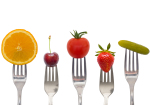- FreeTrainers.com Forums
- Specific Diets & Nutrition
- Eat right for your Type
Group: Specific Diets & Nutrition
Created: 2012/01/01,
Members: 104,
Messages: 22775
With so many diets and nutritional plans out there, you can get lost. Find out what works best for others and share your experiences!
Join group
Eat right for your Type

Sempai
Posts:
447
Joined: 2002/06/06  |
2002/08/29, 05:38 PM
Has any one tried this diet by Peter D'Adamo. This is based on your blood type. If anyone has tried it or any info regarding the whole concept please share.---------------------------- Never be afraid to try something new. Remember the ark was built by amateurs, The Titanic was built by professionals. |
|
| |

gwood
Posts:
16
Joined: 2002/08/15  |
2002/08/29, 10:00 PM
This info is a book review so it may be a little long but here goes...Book Review: Eat Right 4 Your Type (1996) Author: Peter J. D'Adamo, N.D. Publisher: Putnam Reviewed by: Edward Blonz, Ph.D. According to naturopath Peter J. D'Adamo, your blood type is a genetic fingerprint that is more powerful than race, culture or geography. It all has to do with lectins, a diverse group of proteins that are present in certain foods. D'Adamo, who is a naturopath, claims that negative reactions between food lectins and our blood are responsible for many ailments. His solution is to avoid the foods that contain all those bad lectins. The list of what's good and what's bad, however, is extensive and differs dramatically according to your blood type. The book states: Type O's (46 % of the population), belong to the oldest genetic group and need to eat meat virtually every day to satisfy your ancient, hunter-gatherer genes. Type O's should also avoid oats, wheat, and most grains, because they are all products of an agriculture that didn't exist when O's originated. Type A's (40% of the population) evolved after the start of agrarian society and are best off as a vegetarian. Type B's (10 % of the population) emerged as humans migrated toward colder, harsher climates. Bs' can have the most varied diet, including meat, and theirs is the only blood type that does well with dairy products. Type AB (4% of the population) is a relatively modern adaptation that arose from the intermingling of the A's and the B's. Therefore, AB's have the benefits and intolerances of types A and B. The concept of blood type originated in the early years of this century with German pathologist Karl Landsteiner. He identified two proteins, or antigens, that he found on the surface of the red blood cell. Calling these antigens A and B, Landsteiner proceeded to describe four blood groupings, A, B, AB, and O, according to whether they had one or the other, or both, or neither. Since then we've learned that type A's can have either AA genes or AO genes, B's can be BB or BO, ABs have to be AB, and O's have to be OO. The genes for these proteins are passed to us from our parents. Landsteiner didn't know it at the time, but the ABO identification system was only the start. In the years since his pioneering work, 276 discrete red-cell antigens have been discovered. Let's examine D'Adamo's logic by looking at hypothetical pairings of four couple's: a type AB couple, a type A couple, a type B couple and a type O couple. According to D'Adamo, each of these couples would be a descendent of a separate ancestral populations. If we then looked at the children from these pairings, those from the AB couple could end up from the A, B or AB ancestral populations, the type A couple could produce children from the A or the O ancestral population, and the type B couple could have children that were from the B or the O ancestral population. Only the type O couple would pass the same blood type on to all of their children. Since there are 50,000 to 100,000 genes contained in human DNA, the passing of genes from one generation to the next is tantamount to a role of the genetic dice. Granted what's on those dice is determined by one's parents, and there are some factors that do seem to dominate, but the potential for variability is enormous. Scientists at the Human Genome Project have been analyzing the structure of human DNA, a project expected tp span 15 years and cost several billion dollars. Blood type is not totally benign. For many years, scientists wondered why type O's were more likely to than other blood types to develop stomach ulcers or stomach cancer. In 1993, scientists found that ulcers were caused by helicobacter pylori, a bacterium which had a special affinity for one of the unique type O proteins. A geneticist at Oxford University who checked for other significant associations between the ABO blood types and the incidence of disease, reported that there were only seven,; the relationships were often weak; and most, like ulcers, originated somewhere along the digestive tract. If the ABO blood type was that much of a key, as D'Adamo posits, these relationships would strong and plentiful. It may well turn out that there are important interactions with between certain foods and one's blood type. But the passing of genes from one generation to the next is tantamount to a role of the genetic dice. Granted what's on those dice is determined by one's parents, and there are some factors that do seem to dominate, but over the millennia there has been an infinite variety of genetic mixing. It is a bit of a stretch to say, for example, that a type O today has the same genetic imperatives as a type O roaming the Savannah with spear in hand. D'Adamo, unfortunately, offers little in the way of scientific evidence, relying instead on a collection of anecdotal reports and case histories. His speculation that the one gene responsible the ABO blood type could exert such a dominant influence over everything else is unable to stand on its own merits. In the end, D'Adamo adds the caveat that individual variations still occur within blood types, so you shouldn't expect all of his recommendations to apply to you. It's nice to have it both ways, especially where book sales are involved. ___________________ Dr. Blonz is a nutrition consultant, journalist, media personality, and public speaker. He obtained his doctoral degree in nutrition from the University of California, Davis. His Web site, the Blonz Guide to Nutrition, Food Science and Health, links to many reliable nutrition sources. |

Brat
Posts:
6
Joined: 2002/08/21  |
2002/08/30, 05:17 PM
I have heard that this type of eating does wonders (as long as you stick to it!) I have a friend who was trying it with his girlfriend (she is the one that wanted to do it and he went along with her for support) he really didnt believe in the stuff unitil he noticed HUGE changes in his body. Not necisarily weight loss, cause he really didnt have much to loose but he wasnt tired anymore, he really couldnt believe it for himself! So, if your interested, look into it and give it a try, you have to remember though its a lifestlye change not just a month or two kind of deal. If you do it, let me know how it went! |
